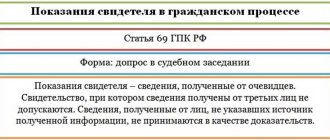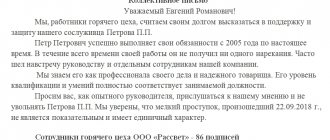Why do you need a motion to call witnesses? Is it necessary to declare it or can you do without it? Who are witnesses and why are they needed? Let's answer these and other questions.
A request to call witnesses must be made in order for them to be invited and heard in court. The court will not invite them on its own initiative. It is better to submit the petition in writing so as not to miss all the requirements that are provided for by the Code of Civil Procedure of the Russian Federation.
:
Petition to call witnesses
Rights and obligations of a witness in a civil case: a brief educational program
From the point of view of civil procedural law, a witness is a person who may know any information about circumstances relevant to the consideration and resolution of a civil case.
In accordance with the provisions of Art. 70 of the Civil Procedure Code, each witness is obliged:
- When summoned by a judge to appear in court, which is hearing a civil case;
- Inform the court of all information known to him about the case;
- Answer the questions asked;
- Upon request of the court, produce written notes and documents used by it;
- Maintain order during the court hearing;
- Obey the orders of the presiding officer.
At the same time, the witness has the right:
- Give evidence in your native language;
- Use the services of a translator for free;
- Do not report any information against yourself, your spouse or close relatives;
- Read the documents related to his testimony.
Note! In 2021, a witness in a civil case is liable for refusing to testify under Art. 308 of the Criminal Code of the Russian Federation, as well as for giving knowingly false testimony under Art. 307 of the Criminal Code of the Russian Federation, if the testimony does not concern himself, his spouse and close relatives.
How to file a motion to call witnesses
A petition can be submitted at any stage of consideration of a civil case. You can attach a written request to the statement of claim when filing it with the court. You can ask about calling witnesses during preparation or at a court hearing. The timing depends only on the position of the person making the call. However, we advise you to do this as early as possible so as not to delay the consideration of the case.
Any person participating in the case who is charged with proving the relevant circumstance may apply for a summons. This may be the plaintiff, the defendant or a third party. Witness testimony can refute the circumstances that the other side is trying to prove.
The petition can also be submitted orally, but it must contain the following information:
- full last name, first name and patronymic of the person being called
- full address of residence
- circumstances that the person can confirm
- if the person called is a child, his age
Usually several witnesses are called to court; 2-3 people are quite enough. You should not call people who will give exactly the same testimony.
Who does not have the right to act as a witness in a civil case? We study the Code of Civil Procedure of the Russian Federation
General requirements for the circle of persons subject to being called for questioning as a witness are enshrined in Art. 69 Code of Civil Procedure of the Russian Federation. In accordance with the provisions of this article, the following categories of citizens are not subject to questioning as witnesses:
Representatives in a civil or administrative case, or defense attorneys in a criminal case, a case of an administrative offense, or mediators - about the circumstances that became known to them in connection with the performance of the duties of a representative, defense attorney or mediator;
Judges or jurors - about questions that arose in the deliberation room in connection with the discussion of the circumstances of the case when making a court decision or sentence;
Priests of religious organizations - about the circumstances that became known to them from confession.
Resolution of application, interrogation
The court resolves the request to call witnesses by issuing a ruling. Before this, he will listen to the opinions of all persons involved in the case.
The court resolves the petition at a court hearing. Therefore, the applicant can immediately invite witnesses on his own; they will be questioned by the court in the same process.
Otherwise, if the petition is granted, the court will postpone the hearing to call witnesses. The court may serve subpoenas on witnesses to the person filing the petition.
Expert opinion
Novikov Igor Timofeevich
Legal consultant with 6 years of experience. Specializes in the field of civil law. Law teacher.
After the court grants the request to call a witness, he is protected by law. Criminal liability is provided for bribery, threats, coercion to testify or refusal to testify.
Minors are questioned in court in the presence of a teacher and legal representatives. At the discretion of the court, some of those present at this time may be removed from the courtroom.
Witnesses must come to court with a passport to establish their identity. Before interrogation, citizens are warned about criminal liability for giving false testimony.
During interrogation, the summoned citizen must freely tell what he personally knows about the circumstances of the case. Participants in the trial ask the witness clarifying questions. The first to ask questions is the person at whose request he was summoned. The judge can ask questions at any time.
Costs incurred for a witness's appearance in court can be recovered by filing a claim for costs.
Clarifying questions on the topic
How to write a petition to call witnesses?
Quite often, during the defense of a suspect or accused, a lawyer has to file a motion to call witnesses and question them.
If it is necessary to file a petition for the interrogation of witnesses during the preliminary investigation, it is submitted to the investigator (a sample petition for the interrogation of a witness is published below).
If the need to question a witness in a criminal case has arisen in court, the lawyer files a motion to summon the witness to court and interrogate him (a form of motion to summon a witness to court is also posted below)
Since the person who filed the petition must substantiate it (Part 1 of Article 271 of the Code of Criminal Procedure of the Russian Federation), the petition must indicate what information the investigator or court can obtain from this person, what significance the testimony of this witness may have for establishing the circumstances to be proven in a criminal case business.
If for some reason the investigator or the person conducting the inquiry refuses to satisfy the request to question witnesses, their decision can be appealed to the prosecutor or the head of the body conducting the preliminary investigation in accordance with Art. 124 Code of Criminal Procedure F or to court in accordance with Art. 125 Code of Criminal Procedure of the Russian Federation.
It is also necessary to keep in mind that a person (the victim, his representative, the suspect, the accused, their defense attorney), whose petition was rejected by the court, has the right to submit it again during further proceedings (Part 3 of Article 271 of the Code of Criminal Procedure of the Russian Federation).
The court does not have the right to refuse a request to summon and question a witness or specialist who has appeared in court at the initiative of the parties (Part 4 of Article 271 of the Code of Criminal Procedure of the Russian Federation).
Filing a petition to the court
A petition may be filed with the court:
- both orally and in writing - in civil, criminal proceedings and administrative proceedings (clause 1 of article 35 of the Code of Civil Procedure of the Russian Federation, clause 1 of article 120 of the Code of Criminal Procedure of the Russian Federation, subclause 9 of clause 3 of article 205 of the CAS RF) ;
- in written, oral or electronic form - in the arbitration process (clause 1 of article 41, clause 1 of article 125, subclause 6 of clause 2 of article 155 of the Arbitration Procedure Code of the Russian Federation);
- only in writing - within the framework of a case of an administrative offense (Clause 2 of Article 24.4 of the Code of Administrative Offenses of the Russian Federation).
A petition submitted orally during a court hearing is entered into the minutes.
A written request can be sent in the following ways:
- Through a personal appeal by the petitioner or his representative to the court office or the court expedition unit. In this case, the copy of the petition remaining with the applicant is marked with the date of acceptance, position and full name of the court employee who accepted the document.
- By mail. The most convenient option in this case is to send a valuable letter with a list of attachments, providing proof that the applicant sent the document to the court.
- Through the “My Arbitrator” service (only for arbitration courts).
A petition in arbitration and civil proceedings can be sent by any participant in the case. The list of persons entitled to file a petition as part of a criminal trial is regulated by paragraphs. 1, 3 tbsp. 119 Code of Criminal Procedure of the Russian Federation.
So, the petition to call witnesses is drawn up in free form. In this case, all necessary attributes must be specified.
Particular attention should be paid to recording the list of circumstances that must be confirmed or refuted by testimony. This request can be made to the court either orally or in writing (for civil and criminal proceedings) or only in writing (as part of the arbitration process).
Note!
- Issues of divorce and collection of child support are considered in two different trials. Therefore, it is advisable to file two claims in court. The claim for alimony will be considered by the court without delay, and the spouses will be divorced within 1 to 2 months.
- Cases regarding the collection of alimony are not classified as complex. You are quite capable of drawing up a statement of claim on your own, collecting the entire package of documents attached to it and personally submitting it to the court Read more>>
- We do not recommend using the services of sites that promise to remotely draw up a claim for money and file it in court without your participation.
- When collecting alimony in a fixed amount, or if the defendant has several sources of income, some of which he hides, the assistance of a qualified lawyer may be required. The participation of a lawyer in resolving such disputes is not necessary; a lawyer without a lawyer’s status can successfully represent your interests in court.
- Mandatory conditions when choosing a representative, a lawyer or lawyer, are his legal literacy, experience, impeccable reputation and specialization in conducting divorce cases.
How to submit an application
A petition to call witnesses in a civil case has one distinctive feature: it must explain in detail what circumstances of the case under consideration will help clarify the testimony of the witness. Since in civil proceedings the judge has the right to refuse such a request, it is necessary to justify the request as clearly as possible.
Otherwise, the application form is practically no different from other applications presented during civil proceedings. Its structure looks like this:
- A cap
- name and address of the court;
- plaintiff's details;
- defendant's details;
- case details.
- Content part
- Title of the document;
- content of the claim in the case;
- justification for the need to invite these persons as witnesses;
- link to article 35, 55, 69 of the Code of Civil Procedure of the Russian Federation as the basis for filing an application;
- information about the persons who will be summoned;
- applications.
- Date, signature.
Who is a witness
A witness can be any person who has personal knowledge of some event or some significant circumstances of the case. A witness can either be a direct eyewitness to an event or learn about it from other sources. He must tell the court how he knows about the events he is telling. If a witness does not provide the source of his knowledge, his testimony will not be accepted as evidence.
A witness may know the participants in the court session personally, be a relative of one of them, or not know them at all. This does not in any way affect the ability to be a witness in a civil case. The main criterion in this case is the ability of the witness to convey to the court in an accessible and understandable form the information known to him. In this context, it is possible to interview, for example, minor children or persons suffering from a mental disorder who can speak and coherently present information known to them.
When can you apply?
An application to attract witnesses in a civil case can be filed at any stage of the proceedings, up to the removal of the judge to make a decision. However, this should be done only in a situation with newly discovered circumstances. Otherwise, subpoenaing for testimony should be a thoughtful step.
The ideal option is to attach a petition to call witnesses in a civil case to the claim. A timely call will avoid prolongation of the legal process. However, here you need to take into account, first of all, the chosen strategy of behavior.
Responsibilities of a witness
It should be understood that the witness does not have the right to refuse to testify (except for the cases indicated above). If a witness called to testify does not appear at a court hearing, he faces liability if the judge considers failure to appear without a good reason as an insult to the court.
Therefore, when naming the names of witnesses, it is worth being selective.
Expert opinion
Novikov Igor Timofeevich
Legal consultant with 6 years of experience. Specializes in the field of civil law. Law teacher.
At the same time, Russian legislation provides for the possibility of giving testimony in writing. For situations in which it is possible to obtain evidence in this format, Art.
69 of the Code of Civil Procedure of the Russian Federation includes cases when a person cannot attend court in person for a good reason. For example, for health reasons due to serious illness or disability.
When appointing witnesses, it is important to remember that their testimony must not only be significant for the case ( Article 56 of the Code of Civil Procedure of the Russian Federation ), but also truthful ( Article 307 of the Code of Criminal Procedure of the Russian Federation ).









